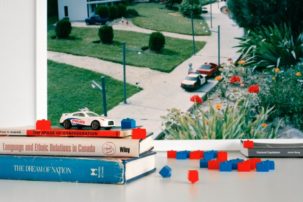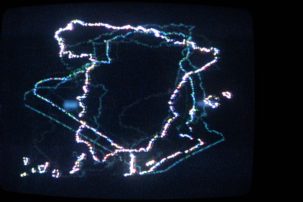Translation is any transfer from one thing or place to another. Beyond and besides language, translation functions as a metaphor: translation between cultures, between artforms, between the living and the ancestral. For my thought to become speech—for my speech to carry gesture—for my gesture to touch another, I translate across my nervous system, my associative web of symbols, the codes of feeling between lovers.
Translation is foremost a question of natural language. Its original event is the Tower of Babel: the monolinguistic masses got too close to God, so (devious divinity) He cut off the tongue of universal language at its root, knowing that lossless communication between peoples was the crux of superhuman hubris. All language thereafter is equivocation. Not only between, but also within each natural language, we fumble for the best words; we deflect—or invite— misreadings of our sentences; we dream of a pure, transparent speech in which no meaning is lost: a telepathy of mouths.
Translation must preserve language in its communicable clarity. It must actualize the impossible by expressing one language in another exactly, with no compromise in meaning.
Translation must preserve what is incommunicable in language. It must make the impossibility of communication in one language resound in the incomprehensibility of another. Friedrich Hölderlin recognized the madness of pure translation, and made this madness babble by torturing German syntax into the original Greek syntax in his Sophocles “translations.” This possession of one language by another exposes a language’s limits and propels it into new potentialities.
Translation is an erotic practice. There is no translation without ecstatic attunement to language, without the fervent caress of sentences’ surfaces.
Translation, never not political, is bound to translatio imperii, which thinks of history as the unfurling of power from one empire to another. An invaluable tool for colonialisms of both faith and land, translation is tainted or absolved by what obscurities it makes newly legible.
Translation, never not political, has a history of resistance against imperialist appropriation. It builds trans-linguistic collectivity between marginalized people; it opens roads to political self-determination; it resists the idea of exchange value (for by what coin can we decide to exchange 花 for flower, 花 for blossom?). Ultimately imbricated in power but not inexorably hegemonic, translation makes other worlds possible for those otherwise worldless.
The translator is a shady character, sinewy with betrayal. Traduttore, traditore; the translator and the traitor are drawn in the same breath; their forked tongues favour compulsive lies and gussied up half-truths.
This translator is an empty vessel, a channel that simply allows passage between two languages. They are the vanishing mediator who makes it possible for one language to speak through another; playing coy, they erase every trace of themselves, fearing any fingerprint might mar the finished translation.

 Celia Perrin Sidarous, Vibration (Kerameikos), 2016. Ink-jet print on matte paper, 101.6 cm x 1.23 m. Courtesy
the artist / Parisian Laundry.
Celia Perrin Sidarous, Vibration (Kerameikos), 2016. Ink-jet print on matte paper, 101.6 cm x 1.23 m. Courtesy
the artist / Parisian Laundry.







